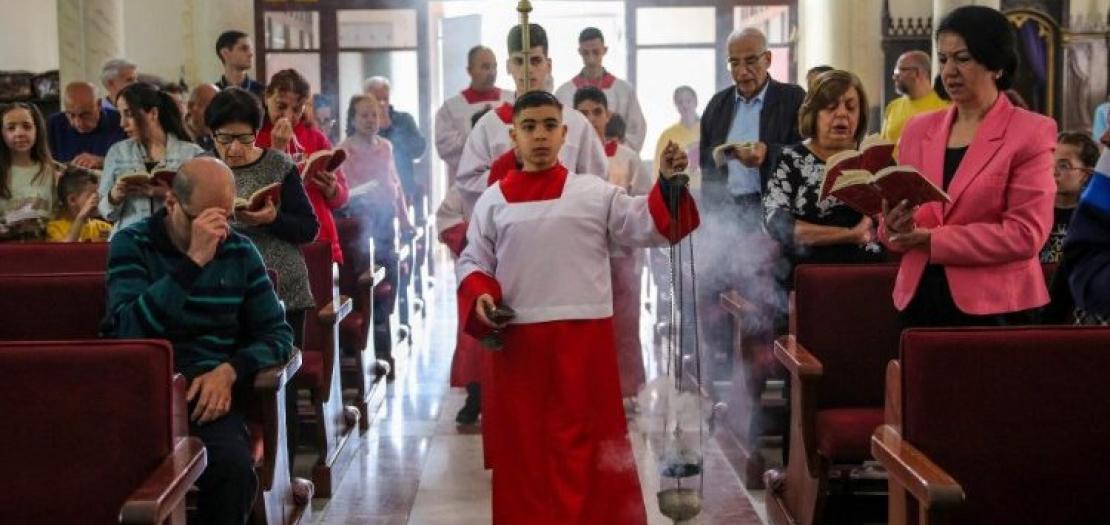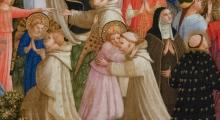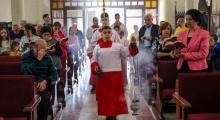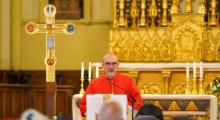Issued by the Catholic Center for Studies and Media - Jordan. Editor-in-chief Fr. Rif'at Bader - موقع أبونا abouna.org

In an interview with Vatican News, the parish priest of the Holy Family Church in Gaza, Fr. Gabriel Romanelli, described the atmosphere in the enclave at the moment.
“More than the lack of food, clean water, and medicine, more than the threat to our safety, what worries me most is that hope might be lost,” Fr. Romanelli explained.
Since people in the Gaza Strip are not being “treated as human beings with rights but as objects,” he said, “hope is fading.”
The hope that this war will end, that peace will return, that homes will be rebuilt, and that the “small and resilient Christian community” will continue is hard to maintain in the midst of the conflict.
The parish priest stressed that the majority of the people living in Gaza are civilians and are in no way part of the armed conflict.
“Our community must resist,” Fr. Romanelli said, “because Gaza must continue to have a visible Christian presence.”
Q: Father Gabriel, what is the situation like now, particularly for the Christian community, which has been sheltering in the parish compound for almost 20 months?
Thanks to the help we’ve received from the Church and many friends around the world, we’ve been able to help not only our parishioners but tens of thousands of families—regardless of religion or origin—who come to us seeking help.
But for nearly three months now, we’ve received nothing from outside the Strip. All aid—whether food, water, or medicine—is blocked at the entrance by the Israeli army. Fortunately, we had stockpiled some supplies, and by rationing them, we’ve managed to survive. However, we can no longer help people outside our own community.
We still have some flour to bake bread, but we have to sift it multiple times because it’s full of worms. We also have to purify all our water to prevent disease. Occasionally, we can get vegetables from local farmers or makeshift street stalls, but they are very expensive. A single onion costs about 10 euros; tomatoes are slightly more affordable—more than 15 euros per kilo.
Now we have to manage our remaining supplies very carefully for the nearly 500 refugees we are sheltering, including about 50 children cared for by the Sisters of Mother Teresa.
We cannot find diapers anywhere in the Strip, even though they are absolutely necessary for both babies and the elderly. When they were available, they cost no less than 3 euros each.
The situation with medicine is desperate. We’ve completely run out, which is especially dangerous for those with chronic conditions—heart patients, people with high blood pressure, diabetics—who now have no access to treatment. Everywhere you turn, you see need.
But above all, no one knows what the future holds for the 2.3 million people living here. And it’s this uncertainty that leads to the loss of hope. People feel abandoned by everyone. They feel that only God still cares about their fate.
Q: Do you hear explosions nearby?
Yes, frequently. [On Tuesday morning, ed.], there were fewer, as the strikes seemed to be focused more to the north. But we hear them constantly, and often shrapnel—sometimes quite large—falls nearby.
There’s a surreal sense of “normalcy.” While we speak, children are playing outside in the parish courtyard. If they were to hear an explosion, even a close one, they would probably keep playing. Danger is left to fate.
When Israeli fighter jets fly overhead, people rush indoors, wait a few minutes in case shrapnel falls, and then go back outside and resume their daily lives. Horror has become routine.
The same happens in church: we are praying together, and suddenly shrapnel hits the roof or the windows slam open from the blast wave—but the prayer continues. This routine gives us more security than fleeing.
Q: For many months, you were comforted by Pope Francis’ daily evening calls. Now we have Pope Leo XIV. What do you expect from the new Pope?
Pope Francis’ 8:00 p.m. call became known as “the Pope’s hour.” Even now, every evening at 8, we ring the bells with the Angelus to remember those calls. Some people, when they hear the bells, still shout, “Good evening, Holy Father!” because his presence is still felt among us.
What Pope Francis did for us was absolutely extraordinary—unprecedented in history.
With Pope Leo XIV, we immediately felt a new encouragement to persevere, especially when—we had set up a screen in the church and, fortunately, had both electricity and internet that evening—he began his ministry with a prayer for peace.
We were all together—Catholics, Orthodox, and many Muslim friends—rejoicing to hear the new Pope plead for peace: for Gaza and for the world.
Q: Father Gabriel, would you like to take this opportunity to send a message to Pope Leo?
Absolutely. I want to tell him how grateful we are for his words of peace, and that our entire community is praying for him. And not just us—Catholics, Orthodox, and Muslims alike feel they have a father.
The closeness of Pope Francis was the closeness of the entire Church. And we continue to feel that closeness with Pope Leo. He is the Successor of Peter, father of the Church, and father of all, of all.







